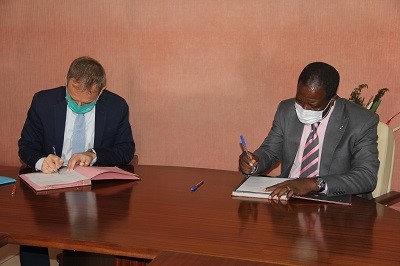UN, Gabon Sign Pact For Peace On Borders With Cameroon And Chad

The United Nations System in Gabon and the Gabonese Ministry of Decentralisation, Cohesion and Territorial Development on August 4 signed a partnership accord for the putting into place of a project named “The Youths, Weavers of Peace in the Border Regions of Gabon, Cameroon and Chad”.
This project, which would span a period of 24 months, is intended to create a network of 1,800 youths aged between 18 and 35 years who would actively participate in the consolidation of peace within the trans-border regions of the three countries through the prevention of instability linked to illicit traffic.
The project is financed by the UN Secretary General’s Fund for the Consolidation of Peace to the tune of US$4 million (2.2 billion FCFA), 845.6 million FCFA of which would go to Gabon.
It is intended to identify an equal number of youths (50 per cent each of male and female) who can contribute towards the emergence of peace in the border zones of the three countries, reinforce their capacities towards the prevention of conflicts and in the participation in pre-emptive alerts.
It will also permit them to participate in the taking of decisions within their communities and to exercise an active role vis-à-vis their local authorities.
The project would also assess the implication of youths in illicit traffic on wild animal species and natural resources as well as all forms of illicit traffic with a view to developing communal economic initiatives and social alternatives which would permit the self-autonomy of the youths.
Parallel to the creation of a network of youths who promote peace, the project aims to recruit 160 authors of social business projects which generate income.
This network of youths would thus contribute to the preservation of national patrimony and to the reinforcement of cooperation and sub-regional integration.
According to the UN Coordinator in Gabon, Stephen Jackson, this project is an advantage for Gabon, a country which is so far free of conflict, to benefit from funds which are generally reserved for countries involved in conflict or post conflict nations.
“However, it is important for this country to continue to preserve what has been acquired by carrying out conflict-prevention activities as is envisaged in the project”, advised Stephen Jackson.
Support Our Journalism
There are millions of ordinary people affected by conflict in Africa whose stories are missing in the mainstream media. HumAngle is determined to tell those challenging and under-reported stories, hoping that the people impacted by these conflicts will find the safety and security they deserve.
To ensure that we continue to provide public service coverage, we have a small favour to ask you. We want you to be part of our journalistic endeavour by contributing a token to us.
Your donation will further promote a robust, free, and independent media.
Donate HereStay Closer To The Stories That Matter




